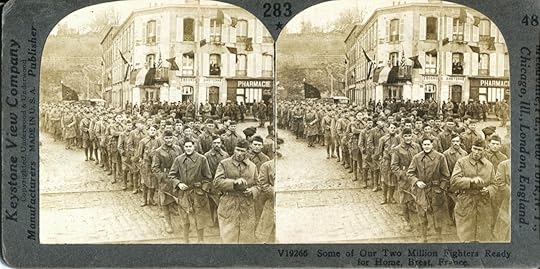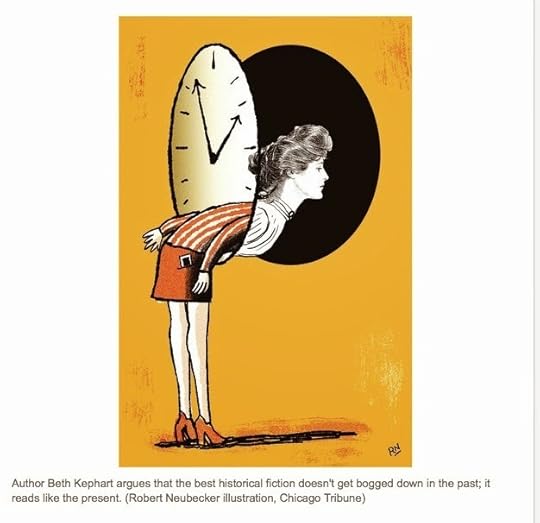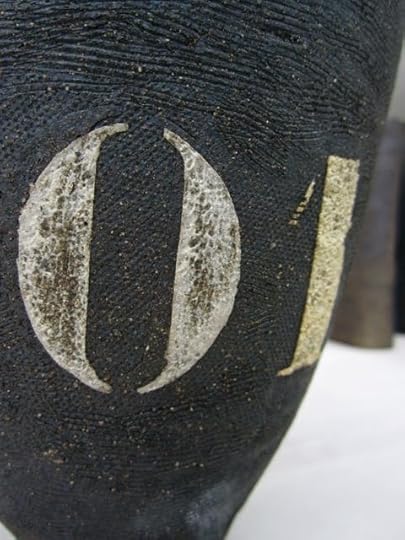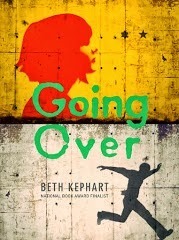Beth Kephart's Blog, page 82
June 16, 2014
Taking the long way around the novel. When will I learn?
 You know how I don't outline my novels?
You know how I don't outline my novels?(I don't.)
How I want to be surprised by where they take me, by the weather that shows up, by the unforeseen turn?
(I do.)
Sometimes all that spontaneity can be a real big pain in the butt.
Like. Here I am, 175 pages into a new novel and this brand-new character shows up. She's lying on somebody else's bed. There's seashore sand blowing in with the breeze. There's an animal in a cage at her feet.
What the heck is she doing there?
And why oh why did I find her?
And do I really think there's any hope for this book if I can't keep it on the track I thought it was on?
Beth Kephart Novels: The work of a detour-ist.




Published on June 16, 2014 15:13
June 15, 2014
The Gifts of Father's Day
 A stereoscopic image from World War I: "Some of our two million fighters ready for home, Brest."
A stereoscopic image from World War I: "Some of our two million fighters ready for home, Brest."(In honor of the upcoming Lore Kephart Distinguished Historians Lecture at Villanova University, with WWI expert Isabel Hull, October 9, 2014) (Found at the incredible Briar Vintage in Philadelphia's Old City.)

A box of locally-sourced delectables from John & Kira's Chocolates, bought at the Bryn Mawr Farmers' Market.

A jar of Blue Elephant happy go lucky summery meadowflower raw honey, found a few stands down from John & Kira's.
The books that didn't yet arrive. Brunch at Nudy's.
My husband will have gifts of his own, of course, and whatever movie he wants to go to, if indeed he chooses to leave the side of World Cup Soccer (this remains doubtful). But since he often stops by to look over my shoulder while I am typing, I will not be posting such gift images here.




Published on June 15, 2014 05:28
June 14, 2014
We are the Goldens/Dana Reinhardt: Reflections
 Dana Reinhardt's new novel, We are the Goldens, arrives, and I'm already predisposed to love. I'd shared a panel with Dana in Texas not long ago. I'd sensed, at once, that she was a serious writer—which is not to say unfunny. Just the sort of writer who cares about the quality of her work first, and about all the hubbub (if indeed she cares about the hubbub) later. Writing to be read, not writing to be famous. This was my sense of Dana.
Dana Reinhardt's new novel, We are the Goldens, arrives, and I'm already predisposed to love. I'd shared a panel with Dana in Texas not long ago. I'd sensed, at once, that she was a serious writer—which is not to say unfunny. Just the sort of writer who cares about the quality of her work first, and about all the hubbub (if indeed she cares about the hubbub) later. Writing to be read, not writing to be famous. This was my sense of Dana.Having closed one overly hyped book earlier in the week with a deep sense of disappointment, even despair, I opened Dana's this morning with a few nerves. I needed this book to be good. I needed to be restored. I needed to shut down all the voices in my head that were saying, Quality no longer counts.
I wanted to be able to write right here that I'd encountered a book lovely and right.
I'm writing that here. Lovely. Right.
We are the Goldens is the story of two sisters living intertwined lives. Two teens trusted by their divorced parents to make smart decisions. Two girls who always turn to each other first. But now one has a terrible secret and the other is being locked out. Nell presses. Layla retreats. Nell gets into some trouble of her own. Maybe parental supervision is necessary after all. Maybe teens don't in fact know everything, could use a little help when life gets messy.
We are in San Francisco, and the city is beautifully drawn. We are inside a family where love lives, but some messages get bungled. Nell has a best friend named Felix. Layla has a lover she can't name. There is a private school that is full of privileges and projects—art, a play—that are typical teen fare, and teen danger.
We see all this because Dana takes the time to show us. To build the family. To establish a reliable voice (Nell's, who speaks over all 199 pages, directly to Layla). To fully establish scenes. To not assume that brand names tell the reader everything, or that characters are adjectives, or that clever is the only form of conversation. Teens live complex lives. Their communities are entangled. There's more at stake than high school gossip. Adults (I repeat myself) can make a difference.
It's all here, in this slender novel. And so is Dana's immaculate voice. Clear. Consistent. Ever intensifying as the story unfolds.
And real.
I leave you with this example:
I feel bad that Mom hasn't remarried. She wants to, and I know that the reason she hasn't has something to do with us. It's not like we've tried to sabotage any of her relationships; it's just that even though we spend three out of every seven days with Dad, we take up a lot of space. Mom is tirelessly devoted to us. We are her north, her south, her east, her west, to quote that W.H. Auden poem. I know it's about a death, but to Mom we're her compass, even if somethings that's not how it feels.




Published on June 14, 2014 05:46
June 13, 2014
reflecting on urgent historical fiction in this weekend's Chicago Tribune
 What makes for urgent historical fiction? Having pondered the issue while writing my own backward-glancing novels, I decided to tackle the question for Printers Row/Chicago Tribune and see what some careful consideration might teach me.
What makes for urgent historical fiction? Having pondered the issue while writing my own backward-glancing novels, I decided to tackle the question for Printers Row/Chicago Tribune and see what some careful consideration might teach me.I'm grateful, as always, for the privilege of time and space in that wonderful publication.
My piece, which reflects on all historical fiction (which is to say no boundaries between Adult and Young Adult) begins like this:
<!-- /* Font Definitions */ @font-face {font-family:Cambria; panose-1:2 4 5 3 5 4 6 3 2 4; mso-font-charset:0; mso-generic-font-family:auto; mso-font-pitch:variable; mso-font-signature:3 0 0 0 1 0;} /* Style Definitions */ p.MsoNormal, li.MsoNormal, div.MsoNormal {mso-style-parent:""; margin:0in; margin-bottom:.0001pt; mso-pagination:widow-orphan; font-size:12.0pt; mso-bidi-font-size:10.0pt; font-family:"Times New Roman"; mso-ascii-font-family:Cambria; mso-ascii-theme-font:minor-latin; mso-fareast-font-family:Cambria; mso-fareast-theme-font:minor-latin; mso-hansi-font-family:Cambria; mso-hansi-theme-font:minor-latin; mso-bidi-font-family:"Times New Roman"; mso-bidi-theme-font:minor-bidi;} @page Section1 {size:8.5in 11.0in; margin:1.0in 1.25in 1.0in 1.25in; mso-header-margin:.5in; mso-footer-margin:.5in; mso-paper-source:0;} div.Section1 {page:Section1;} </style> <br /><blockquote class="tr_bq"><div class="MsoNormal">“There is no real anonymity in history,” Colum McCann writes in the acknowledgments of <i style="mso-bidi-font-style: normal;">TransAtlantic,</i>his gorgeous time traveler of a book.</div><div class="MsoNormal"><br /></div><div class="MsoNormal"><i style="mso-bidi-font-style: normal;">No anonymity.</i> No facelessness. No oblivion.</div><div class="MsoNormal"><span style="mso-tab-count: 1;"> </span></div><div class="MsoNormal">Life is specific, and so is history. It’s emergent, conditional, personal, and absurd. </div><div class="MsoNormal"><br /></div><div class="MsoNormal"><span style="font-family: Calibri, Verdana, Helvetica, Arial;"><span style="font-size: 12pt;">Why, then, does so much historical fiction land like a brick, with a thud? Why does it hint of authorial Look what I know, See how I found out? Why do so many writers of historical fiction seem to prefer the long way around the heart of the story? Why ignore the truth that the best historical fiction is as insistent as now?</span></span> </div></blockquote>And continues <a href="http://www.chicagotribune.com/feature... <div class="feedflare">
<a href="http://feeds.feedburner.com/~ff/BethK... src="http://feeds.feedburner.com/~ff/BethK..." border="0"></img></a> <a href="http://feeds.feedburner.com/~ff/BethK... src="http://feeds.feedburner.com/~ff/BethK..." border="0"></img></a> <a href="http://feeds.feedburner.com/~ff/BethK... src="http://feeds.feedburner.com/~ff/BethK..." border="0"></img></a> <a href="http://feeds.feedburner.com/~ff/BethK... src="http://feeds.feedburner.com/~ff/BethK..." border="0"></img></a>
</div>
Published on June 13, 2014 09:57
June 12, 2014
Hyped Out? Does Excessive Blare Hurt a Book in the Long Run?
 Yesterday, as my Facebook friends know, I read a young adult novel that emerged from the gates so high on hype, so overloaded with blurb promise, that it seemed it would be a national tragedy if we didn't all stop and read at once. Sure, there were cautions laced into many reviews. Still, there was overwhelming hype.
Yesterday, as my Facebook friends know, I read a young adult novel that emerged from the gates so high on hype, so overloaded with blurb promise, that it seemed it would be a national tragedy if we didn't all stop and read at once. Sure, there were cautions laced into many reviews. Still, there was overwhelming hype.I rarely bend to hype.
This time I did.
I bought the book. I read.
I wonder how I would have felt about this book had there not been a blazing publicity campaign, and if I had not felt manipulated into reading. Would I have been more forgiving about its thin characterizations, its one-sided plot, its glib sleights of hand? Would I have received the book as I receive most books—as the best a well-meaning author could do?
Would I have found more to like?
Would I have drawn more gentle conclusions?
Would I give another book by this author a chance?
I suspect the answer is yes to all of the above. The narrative flaws would still be there, of course. The thinness, the surface crawl. But I suspect that I wouldn't feel angry (for in this case I felt angry) as I turned the last page. I wouldn't feel somehow stolen from. I wouldn't feel explicitly manipulated.
How complicit are authors in their own marketing campaigns? How do they really feel, behind the labels and the P.R. promise? It's different for everyone, of course, and no one can know how a hyped author actually feels when the book arrives with trumpets blaring.
But I think the book world, and book people, would be better off without shouting quite so loud about a package. Tell us what the book is and who loved it, absolutely. But keep that language real. Keep it realistic, too. Let us feel as if we found a book, and weren't commanded into reading.




Published on June 12, 2014 06:22
June 11, 2014
Age is age, but I am grateful, always, for longevity
 I have a friend.
I have a friend.That's how the stories begin. I have a friend, and we....
Here, today, is my "we" story.
I have a friend. I have known her forever. I have known her family, too. A little high school. A week in Hilton Head. All of college. Her graduate school. The little business I began. My wedding. Her wedding. Children. She has stood with me by mother's grave and has walked with me at the park, and I have walked with her. Last night her eldest graduated from high school and in the hours afterward, I sat in my friend's festive home, with my friend and my friend's mother, father, husband, sons. We sat as if it had not been years since we'd all been together.
I have reached that age when I value, enormously, long stretches, real memories, honest connections. People who don't just talk, but also listen. People whose children I prize and whose parents I know. People whose parents know me. The jokes are on us, and with us, and it is good to laugh, and we do.
Age is age, and I have regrets, of course.
But I am grateful (and will be until life is no more) for the room long friendships make for me.




Published on June 11, 2014 05:03
June 9, 2014
GOING OVER is the Gold Medal Winner of the Parents' Choice Awards, Historical Fiction
 And I am flummoxed.
And I am flummoxed.And INCREDIBLY grateful.
Oh my goodness.
Teresa DiFalco, Parents Choice Awards: How can I thank you?
The astonishing citation is here.




Published on June 09, 2014 16:42
Jen Doll Responds to the Read YA Controversy with Thoughts About Nuance—
 and this is one of the many things I love about Jen.
and this is one of the many things I love about Jen.Jen's whole piece, on Hairpin, is here.
Her final words are a sweet, right challenge:
So read, read Y.A., read adult literature, read blog posts, read magazines, read your box of Cheerios in the morning. Read all you can and want to read, acknowledging the easy and unchallenging and the difficult and complicated, and form your own opinions, trying to add a little room for nuance and understanding and openness in all that you do. That’s the best you can do as a reader, a writer, and a human.And how honored am I to have Going Over included among works by Markus Zusak, Nina LaCour, Andrew Smith, Cammie McGovern, Laurie Halse Anderson, Sherman Alexie, Aaron Hartzler, E. Lockhart, and Matthew Quick on Jen's "10 Contemporary Y.A. Books That Made Me Think (and That I Loved)."




Published on June 09, 2014 14:28
One Thing Stolen: First Galley Page
 Chronicle Books and Tamra Tuller: They produce a beautiful book.
Chronicle Books and Tamra Tuller: They produce a beautiful book.I didn't allow myself to start reading the galleys of my Florence novel until I pushed passed 35,000 words on my novel-in-progress.
Now I breathe. And soon I'll read.




Published on June 09, 2014 13:48
Did I write? No. Did I live? I did.
 This weekend I was reminded of the power of the unplanned. Of all the things that happen when we make room for the unexpected.
This weekend I was reminded of the power of the unplanned. Of all the things that happen when we make room for the unexpected.For example: My husband was to have been in Seville all weekend long to celebrate his mother's birthday, and I was to be writing my novel. A snafu with a still-very-valid passport (!) and a US Airways approved boarding pass sent my husband home. My quiet days became:
* a lovely Wednesday evening dinner with my father and my suitcase-still-in-hand husband
* many trips to the Wayne Art Center, where my husband's work was showing and where new work was delivered from the kiln
* a trip to the Bryn Mawr Film Institute to see the fabulous "Belle"
* a casual conversation with a neighbor that turned into a shared starry-sky meal
* a Sunday outing with our friend, Julie, who came to Wayne to see my husband's clay, then deigned to walk and sit with us
* a Sunday dinner with my father—just three of us in a farmhouse restaurant enjoying a hard-earned peace
Did I write all those planned pages of the novel? No. Not exactly. Did I live? Oh, yes. I did.
I'm pretty sure that, in this life, living comes first.




Published on June 09, 2014 05:16



